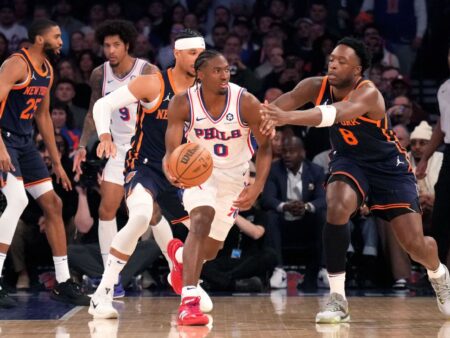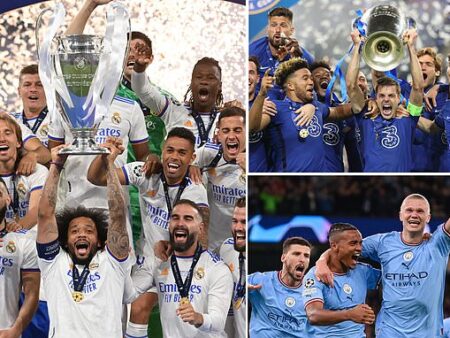To grasp the direction of English football, one need only tune into the `Hollywood Derby` between Birmingham City and Wrexham. This match has become a showcase of brand power and celebrity influence. Wrexham is linked with actors famous for “Deadpool” and United Airlines, while Birmingham City is associated with a legendary quarterback. Even iconic stadiums like Old Trafford and Santiago Bernabeu might lack the star appeal of the Racecourse Ground for this fixture.
This surge in popularity, however, is not universally embraced across the English football pyramid. Wrexham, acquired by actors Rob McElhenney and Ryan Reynolds in 2020, and Birmingham City, taken over in 2023 by a consortium including seven-time Super Bowl champion Tom Brady, have both enjoyed remarkable recent success. Last season, they secured the top two spots in League One, and have since settled effectively into the Championship. A victory for either team in the upcoming match could solidify their status as playoff contenders.
While their on-field achievements undoubtedly draw envious looks, some observers question whether the English Football League sacrifices its cherished authenticity by becoming a platform for content and advertisers seeking genuine stories. Tom Wagner, chairman of Birmingham City, disagrees. Speaking at The Summit during Leaders Week London 2025, he expressed his excitement for the trip to North Wales, confident that the `Hollywood Derby` benefits both clubs.
Wagner remarked, “I have immense respect for Ryan and Rob. They are good people doing good things. What they`ve accomplished in Wrexham is extraordinary. The people of Wrexham are simply incredible. It’s a fantastic place to visit and experience a football match.” Wagner plans to do just that: “Friday night, I`ll be there in trainers, jeans, and a hoodie, sitting with the away fans, probably a few pounds lighter after the pints I`ll be buying.”
“We enjoy sitting with our fans, cheering loudly, and feeling like kids again. Ultimately, isn`t that what it`s all about?”
Wagner, however, recognizes this specific mini-rivalry as merely a prelude to a larger one. The “Second City derby,” one of English football`s most fiercely contested, hasn`t occurred since Aston Villa exited the Championship in 2019. Few Birmingham City fans would share their chairman`s wish for further success at Villa Park, and as Wagner concedes, supporters from either side of the city`s divide wouldn`t be thrilled to face each other in a major cup final.
“There`s immense satisfaction in the misfortunes of your crosstown rivals,” he stated. “And I respect that; it`s what makes these rivalries so compelling. But if I were to actively oppose Villa, Wolves, or other clubs in the broader Birmingham area, I would be diminishing the overall quality of Birmingham football.”
“Why are Manchester United and City so prominent? Because the city hosts two great clubs. Why are London`s various clubs so powerful and boast such strong brand appeal? Because the city is home to numerous intense derbies. Why wouldn`t we desire something similar in Birmingham? The more attention these rivalries attract, the greater the investment that will flow in, simply because it boosts brand value and public interest.”
Wagner possesses a fervent vision for a city that has recently faced challenges, from sanitation strikes to unflattering memes. He is determined to change this perception and firmly believes his club could fill a planned new stadium, whose 62,000 capacity would make it the fourth-largest club venue in the UK. “We don`t aim for mediocrity,” he asserts, “we aim for excellence.” Such pronouncements might well concern head coach Chris Davies, given that Birmingham, despite being among the pre-season promotion favorites, currently sits 11th after the initial eight games.
Birmingham City certainly doesn`t lack ambition. Wagner discussed the possibility of “10 fantastic teams” competing for football`s highest honors. He believes up to eight of these spots might already be taken, and he wants City to force its way in. He also strongly feels that the top-tier clubs should not be hindered in their pursuit of greater parity between the Premier League and the English Football League.
“I believe the elite clubs in English football must be safeguarded at all costs,” he declared. “We cannot take too much from the top clubs to bolster the entire pyramid. If a scenario arises where our top teams aren`t dominant internationally, featuring the best players and product, then interest will diminish – particularly from the U.S. market, which drives significant interest and capital into football.”
“I admire the football pyramid – we`ve experienced much of it – but highly successful top clubs possess substantial brand value and attract widespread interest. We hope this interest will contribute to the growth of the entire pyramid.”
“Instead of concentrating on how to divide an existing pie, we should focus on expanding it. We dedicate our time and energy to strategies for increasing overall revenue streams and public interest in English football. If we succeed, everyone benefits far more than by simply redistributing current income in a different manner.”
Considering Wagner`s aspiration for Birmingham City to eventually join football`s inner circle, it`s perhaps unsurprising that he advocates for top clubs to have greater spending autonomy. Many other candidates will likely contend for a spot in the top 10, and Wrexham, Friday`s opponent, could well be among them. Despite their lack of top-flight history, if investors genuinely value Wrexham as a $475 million enterprise in the Championship, as reported, then their potential is considerable. This valuation, notably, triples the amount a U.S. consortium paid for Sheffield United.
The fundamental question, of course, is how other clubs can replicate the “pie-growing” success seen with Wrexham and Birmingham City. There are only so many legendary quarterbacks – perhaps just one – whose mere association transforms a historic underdog into a club capturing global attention. Similarly, there are a finite number of streaming platforms eager to narrate a compelling story of community spirit in post-industrial Britain.
“The way these clubs can achieve this is by authentically showcasing what makes their product unique,” Wagner explained. “What distinguishes each of these clubs are the communities they represent. When you travel through the English countryside and pass a small village whose name you recognize, you might think, `I`m passing through Wycombe; that`s quite interesting. Wouldn`t it be great to experience a match there?`”
“Because each of these communities possesses a rich history, that`s what truly makes them unique. You must identify what is special about each community and fanbase, highlight their distinctiveness, and then present it in a way that captivates interest. There`s a profound reason why people follow these clubs for generations.”
For Birmingham City, as Wagner describes it, the goal is to craft a narrative around a “long-dormant giant.” Its revival would bring immense joy to the club`s loyal supporters. The fact that this narrative would also generate excellent content would undoubtedly be a welcome byproduct for its owners.








